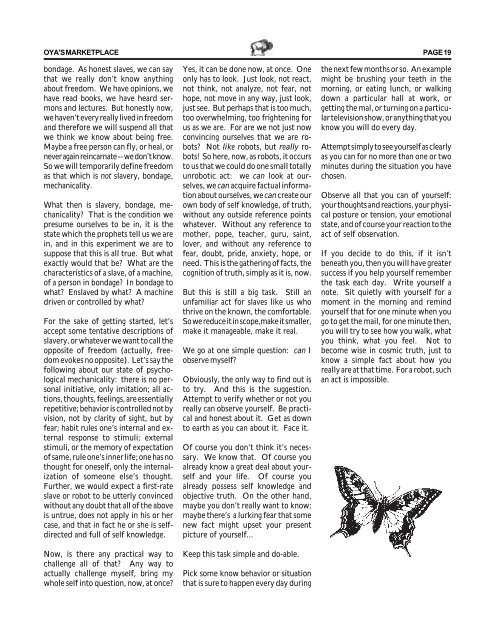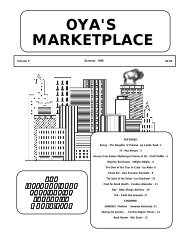OYA'S MARKETPLACE - Oya N'Soro
OYA'S MARKETPLACE - Oya N'Soro
OYA'S MARKETPLACE - Oya N'Soro
Create successful ePaper yourself
Turn your PDF publications into a flip-book with our unique Google optimized e-Paper software.
<strong>OYA'S</strong> <strong>MARKETPLACE</strong> PAGE 19<br />
bondage. As honest slaves, we can say<br />
that we really don’t know anything<br />
about freedom. We have opinions, we<br />
have read books, we have heard sermons<br />
and lectures. But honestly now,<br />
we haven’t every really lived in freedom<br />
and therefore we will suspend all that<br />
we think we know about being free.<br />
Maybe a free person can fly, or heal, or<br />
never again reincarnate -- we don’t know.<br />
So we will temporarily define freedom<br />
as that which is not slavery, bondage,<br />
mechanicality.<br />
What then is slavery, bondage, mechanicality?<br />
That is the condition we<br />
presume ourselves to be in, it is the<br />
state which the prophets tell us we are<br />
in, and in this experiment we are to<br />
suppose that this is all true. But what<br />
exactly would that be? What are the<br />
characteristics of a slave, of a machine,<br />
of a person in bondage? In bondage to<br />
what? Enslaved by what? A machine<br />
driven or controlled by what?<br />
For the sake of getting started, let’s<br />
accept some tentative descriptions of<br />
slavery, or whatever we want to call the<br />
opposite of freedom (actually, freedom<br />
evokes no opposite). Let’s say the<br />
following about our state of psychological<br />
mechanicality: there is no personal<br />
initiative, only imitation; all actions,<br />
thoughts, feelings, are essentially<br />
repetitive; behavior is controlled not by<br />
vision, not by clarity of sight, but by<br />
fear; habit rules one’s internal and external<br />
response to stimuli; external<br />
stimuli, or the memory of expectation<br />
of same, rule one’s inner life; one has no<br />
thought for oneself, only the internalization<br />
of someone else’s thought.<br />
Further, we would expect a first-rate<br />
slave or robot to be utterly convinced<br />
without any doubt that all of the above<br />
is untrue, does not apply in his or her<br />
case, and that in fact he or she is selfdirected<br />
and full of self knowledge.<br />
Now, is there any practical way to<br />
challenge all of that? Any way to<br />
actually challenge myself, bring my<br />
whole self into question, now, at once?<br />
Yes, it can be done now, at once. One<br />
only has to look. Just look, not react,<br />
not think, not analyze, not fear, not<br />
hope, not move in any way, just look,<br />
just see. But perhaps that is too much,<br />
too overwhelming, too frightening for<br />
us as we are. For are we not just now<br />
convincing ourselves that we are robots?<br />
Not like robots, but really robots!<br />
So here, now, as robots, it occurs<br />
to us that we could do one small totally<br />
unrobotic act: we can look at ourselves,<br />
we can acquire factual information<br />
about ourselves, we can create our<br />
own body of self knowledge, of truth,<br />
without any outside reference points<br />
whatever. Without any reference to<br />
mother, pope, teacher, guru, saint,<br />
lover, and without any reference to<br />
fear, doubt, pride, anxiety, hope, or<br />
need. This is the gathering of facts, the<br />
cognition of truth, simply as it is, now.<br />
But this is still a big task. Still an<br />
unfamiliar act for slaves like us who<br />
thrive on the known, the comfortable.<br />
So we reduce it in scope,make it smaller,<br />
make it manageable, make it real.<br />
We go at one simple question: can I<br />
observe myself?<br />
Obviously, the only way to find out is<br />
to try. And this is the suggestion.<br />
Attempt to verify whether or not you<br />
really can observe yourself. Be practical<br />
and honest about it. Get as down<br />
to earth as you can about it. Face it.<br />
Of course you don’t think it’s necessary.<br />
We know that. Of course you<br />
already know a great deal about yourself<br />
and your life. Of course you<br />
already possess self knowledge and<br />
objective truth. On the other hand,<br />
maybe you don’t really want to know;<br />
maybe there’s a lurking fear that some<br />
new fact might upset your present<br />
picture of yourself...<br />
Keep this task simple and do-able.<br />
Pick some know behavior or situation<br />
that is sure to happen every day during<br />
the next few months or so. An example<br />
might be brushing your teeth in the<br />
morning, or eating lunch, or walking<br />
down a particular hall at work, or<br />
getting the mal, or turning on a particular<br />
television show, or anything that you<br />
know you will do every day.<br />
Attempt simply to see yourself as clearly<br />
as you can for no more than one or two<br />
minutes during the situation you have<br />
chosen.<br />
Observe all that you can of yourself:<br />
your thoughts and reactions, your physical<br />
posture or tension, your emotional<br />
state, and of course your reaction to the<br />
act of self observation.<br />
If you decide to do this, if it isn’t<br />
beneath you, then you will have greater<br />
success if you help yourself remember<br />
the task each day. Write yourself a<br />
note. Sit quietly with yourself for a<br />
moment in the morning and remind<br />
yourself that for one minute when you<br />
go to get the mail, for one minute then,<br />
you will try to see how you walk, what<br />
you think, what you feel. Not to<br />
become wise in cosmic truth, just to<br />
know a simple fact about how you<br />
really are at that time. For a robot, such<br />
an act is impossible.



